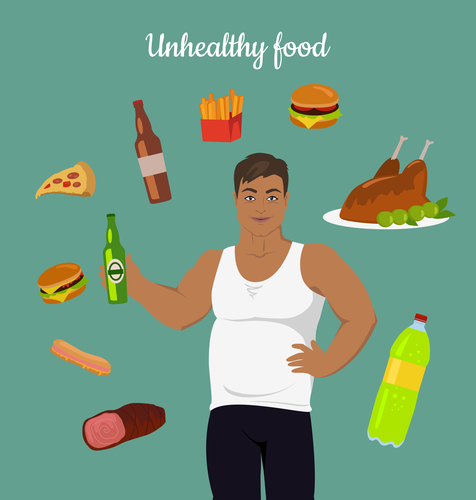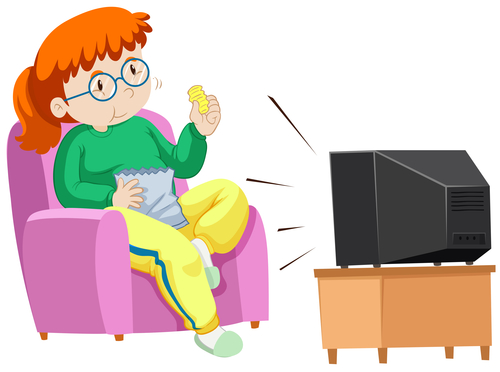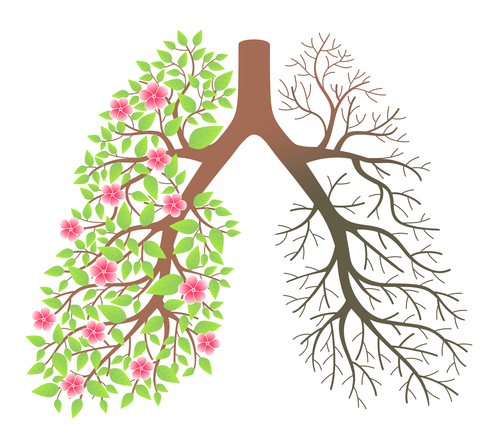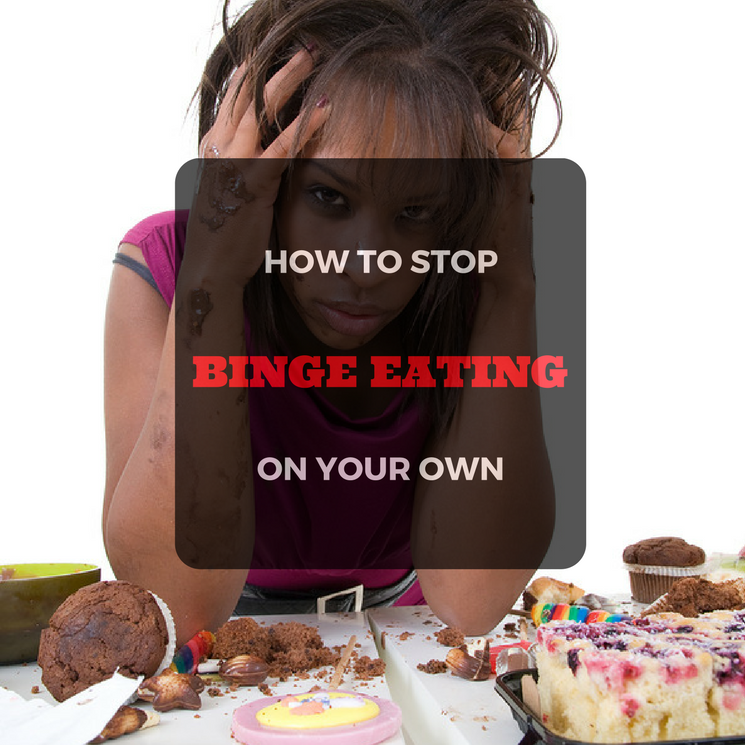Specialists classify binge eating as a disorder in which individuals find it hard to stop eating and also they eat uncontrollably because they are trying to deal with negative emotions and stress. After the food intake, they sense a strong feel of guilt. This is the definition you may find in DSM-V (Diagnostic and Statistical Manual of Mental Disorders – 5th Edition). People consume significant amounts of food, even when hunger is not present. ICD 9 code for binge eating was used to describe this disorder, but it turned to ICD-10-CM codes after October 2015.
When we talk about the US, we may say that 1 in 35 adults are binge eaters according to statistics. This rate makes it more common than anorexia and bulimia. Unlike the last two which affect especially women, binge eating occurs in men, too, at a rate of 40% (source).
It is important for you to understand some of the causes of this disorder. It will help you work out an action plan to get rid of binge eating.
Causes and Risk Factors of Binge Eating
Binge eating typically occurs due to a combination of several factors: from genetic predisposition to personality type, life experiences, and others. It is not all about the food choices we take or about our current lifestyle. Some of these factors are what we are born with, and we cannot do anything about it.
1. Genetic Causes
Biological abnormalities can contribute significantly to the installation of this disorder. The hypothalamus, a region of our brain, controls our appetite. Sometimes, it can send wrong messages for feelings of hunger and fullness. It is the reason why, although we have eaten a lot, we may still feel hungry.
1.1 Gene Mutations
There are also some scientific studies which show that gene mutations in our body may lead us to binge. UCL Institute of Child Health carried out a survey which identified a gene mutation that can cause teenagers to binge. The young persons who have a variation of FTO gene locus (rs1558902) are 20% more likely to become binge eaters, 30% in girls. The study was based at the University of Bristol and analyzed data from 6000 participants, aged 14-16. If you have this mutation as a teen, you will most likely have it as an adult, too. And usually, binging occurs in teenagehood.
The New England Journal of Medicine (March 20, 2003) published the results of a study that incriminates another gene mutation for this disorder. Melanocortin 4 receptor (MC4R), responsible for signaling the appetite suppression looks abnormal in 5% of the obese binge eaters. This study was conducted on 469 severely obese patients. 24 of them had MC4R mutations and all declared that they were binge eaters.
1.2 Bulimia nervosa or Anorexia nervosa
Other evidence shows that there is an inherited predisposition to develop any eating disorder, such as binge eating. For example, University of North Carolina also conducted a study in 2006 which shows that genetic takes 56% of the responsibility for the appearance of anorexia nervosa. If our mother or sister have bulimia nervosa or anorexia nervosa, it is very likely that we develop such a disorder, too. The occurrence of this condition in the families with eating disorders history is four times higher than in the others.
2. Biological Causes
Recent research suggests that the lack of some substances secreted in the brain (like serotonin) predispose some people to anxiety, perfectionism, obsessive-compulsive thoughts and behavior. When we start to starve or eat uncontrollably, we unconsciously change the level of these substances. This situation can induce a state of tranquility or even euphoria, removing the anxiety or depression for a period. So food becomes a kind of self-medication against unbearable feelings.
2.1 Serotonin Level & Binge Eating
 To understand this better and find a binge eating disorder treatment, you should know that serotonin is a neurotransmitter, whose lack is responsible for binging. Binge eaters often crave carbohydrates. After eating them, sugar is converted into tryptophan. During this process, the body releases a hormone called insulin. Insulin helps the sugar from the blood to reach the cells where it becomes pure energy, but we must also notice the other effects that insulin produces in the body. As insulin levels increase, the more tryptophan enters the brain.
To understand this better and find a binge eating disorder treatment, you should know that serotonin is a neurotransmitter, whose lack is responsible for binging. Binge eaters often crave carbohydrates. After eating them, sugar is converted into tryptophan. During this process, the body releases a hormone called insulin. Insulin helps the sugar from the blood to reach the cells where it becomes pure energy, but we must also notice the other effects that insulin produces in the body. As insulin levels increase, the more tryptophan enters the brain.
Furthermore, tryptophan is an amino acid or a group of proteins that affect the levels of the neurotransmitters in the brain. The level of serotonin is directly proportional to the amount of tryptophan. Serotonin regulates the appetite, creates the sensation of satiety and controls the emotions. This process may not function normally for a person with an eating disorder, and the levels of serotonin in the brain remain low. Hence the desire to eat more and not to stop.
2.2 Blood Sugar Levels
One more reason for craving may be our unbalanced blood sugar levels. It means that our body doesn’t tolerate so much sugar. When we eat carbohydrates rich in refined sugar, for example, our blood sugar level bursts. Because our body doesn’t like this state, insulin takes all the sugar from the blood and deposit it to cells. After this happens, the other state appears, low blood sugar. We will feel tired and irritable. And we will also feel the need to bring the sugar back, which means eating more sugar. Now, you understand why your body doesn’t deal with sugar the way it should do.
2.3 Mineral Imbalances
During pre-menstruating days, women often experience mineral imbalances. The lack of magnesium, for example, may lead to chocolate craving as studies showed that cocoa contains an extraordinary amount of magnesium.
3. Psychological Causes
You should also search for past or present traumas if you want to get rid of binge eating.
Children who suffered childhood abuse may develop eating disorders.
Depression and binge eating are intimately related. People diagnosed with this disorder have suffered from depression at least once, while others find it difficult to express their emotions and control. Low self-esteem, loneliness, and dissatisfaction with your own image are possible causes of food addiction.
Unrealistic beliefs and rigid self-imposed standards about food (e.g. “I am not allowed to eat after 18:00”, “If I eat something sweet I will get fat”, “food that I like makes me fat,” “I need to lose weight fast”, “I cannot lose weight without a diet”, etc.) determine a dysfunctional eating behavior and increase the risk of having episodes of compulsive eating.
These tough standards cannot naturally be respected. When you violate some of these criteria, you will consider yourself “incapable,” “disgusting” and you will think “Since I ate a cake it means I can eat anything, anyway I’ll get fat “- thoughts that lead to another episode of binge eating.
Some may say that food is a reward or a method to deal with stress management. “Today I feel good, I can eat a cookie” or “I must eat something sweet to relax.” Boredom is often a trigger for episodes of binge eating.
4. Social and Cultural Causes
4.1. Social Beauty Standard
 Another cause that may lead us to binge eating is the ongoing pressure of the society for having a model’s body. All the commercials, all the movies, and TV shows present perfect bodies without stating what it takes to have this body. Even the dolls for little girls are perfect. It ‘s okay to try to be like this, up to a certain point: when it becomes an obsession. Eating certain foods for another purpose than our health and energy is not quite good.
Another cause that may lead us to binge eating is the ongoing pressure of the society for having a model’s body. All the commercials, all the movies, and TV shows present perfect bodies without stating what it takes to have this body. Even the dolls for little girls are perfect. It ‘s okay to try to be like this, up to a certain point: when it becomes an obsession. Eating certain foods for another purpose than our health and energy is not quite good.
4.2. Food as Reward
 In our early childhood, some of our parents used to offer us food as a reward: “Be good, and I’ll buy you an ice-cream. ”; “Eat your vegetables, and you’ll receive a chocolate cake.” We cannot blame them, as they were living other times. We know now that making food a reward is wrong for the fact that it leads to this imbalanced eating.
In our early childhood, some of our parents used to offer us food as a reward: “Be good, and I’ll buy you an ice-cream. ”; “Eat your vegetables, and you’ll receive a chocolate cake.” We cannot blame them, as they were living other times. We know now that making food a reward is wrong for the fact that it leads to this imbalanced eating.
4.3. Concern for The Way We Look
Increased concern for food and the shape and weight of the body, irregular, and improper diet may lead to the appearance of binge eating disorder.
4.4. Entourage
Friends and family members that eat only junk food relying on the wrong interpretation of the principle “We only have one life. Let’s do what pleases us!”, will determine us to eat in the same way if we are not mentally strong enough to say “no.”
Binge Eaters Types
Here are some types of binge eaters:
- Sad eater – is sad and tries to alleviate the sadness by eating. It can happen after an unpleasant event of loss or a deception.
- Anxious eater – for some people there is a link between anxiety and food, especially if you have a concern for a future event and you try to chase excitement and tension by eating.
- Bored eater – boredom is perhaps the most common form of dietary and emotional environment often associated with emotional hunger. For some individuals, food is the only reason to discontinue the boring activity.
- Lonely eater – he / she uses food as a way to manage emotions generated by something missing – a friend, a companion, a partner with whom to share the life.
- Angry eater – these people fail to get what they want and eat to release their anger. Overeating is the way they can handle their feelings without expressing them.
- Festive eater – people who find it impossible to enjoy an active and important event or meeting without abusing food, the more so as, in our culture, festive meetings play a significant role in all social relationships.
How to Stop Binge Eating – Diet Advices
First of all, to stop binge eating you have to change your diet. While emotional therapy may take longer and the results will appear later, changing the way you eat has an immediate effect on your binging. Here are a few self-help tips you can use to stop binge eating:
1. Fixed Meals
 Skipping meals lowers the blood sugar levels, and you will be more vulnerable to emotional eating. Try to choose foods that are digested more slowly and provide steady blood sugar levels. In this category, you will find the foods with low GI. For instance, seeds and wholemeal bread, brown rice or whole pasta are ideal.
Skipping meals lowers the blood sugar levels, and you will be more vulnerable to emotional eating. Try to choose foods that are digested more slowly and provide steady blood sugar levels. In this category, you will find the foods with low GI. For instance, seeds and wholemeal bread, brown rice or whole pasta are ideal.
2. Always Eat Your Breakfast
A good breakfast can keep you away from the repeated meals, later in that day.
3. Don’t Follow Any Diet
All those restrictions may trigger new binging episodes. If you are under medical supervision, talk to your doctor about what is appropriate to eat.
4. Identify Your Sensations
There is a clear difference between physical hunger, one in which your body asks for food to function properly and emotional hunger, the requesting of food just to make you feel better.
Also, try to banish the comfortable feeling that good food gives you for a short period. You probably find it kind of hard, but you must do this.
5. Keep a Diary
 Write about everything you eat and also about the feelings you had when you did it. You may do this even during your dinner; it might be easier to stop eating. It is critical to notify the causes that made you eat: feelings of anger, sadness or even joy.
Write about everything you eat and also about the feelings you had when you did it. You may do this even during your dinner; it might be easier to stop eating. It is critical to notify the causes that made you eat: feelings of anger, sadness or even joy.
6. Change Your Food
 Usually, binge eaters tend to choose unhealthy food that contains a lot of additives and refined sugar. It is time to change this habit because of one important reason: these foods are addictive. The more you eat, the greater desire to eat more.
Usually, binge eaters tend to choose unhealthy food that contains a lot of additives and refined sugar. It is time to change this habit because of one important reason: these foods are addictive. The more you eat, the greater desire to eat more.
For example, many carbonated drinks contain lots of sugars which have a diuretic effect. Once you drink them, you tend to dehydrate. Therefore, you are thirsty again and begin to drink more and more. The only liquid which can maintain your hydration level is pure water.
Another additive that creates addiction is MSG. You will find this excitotoxin in almost everything you buy from the supermarket. The additive is a cheap flavor and taste enhancer that produces dopamine in the brain, the sensation of feeling well. And this makes you ask for more food with MSG. Look for whole, natural foods and cook them yourself. You may even find that you are a talented cook.
7. Clean Out Your House
 Get the foods that make you binge out of your house. Anyone would say that is more likely to eat a whole chocolate if you have it in front of your face than if you must go to the store to buy it. Buy only healthy, whole food. Find recipes for dishes that you believe you will enjoy and begin to cook them.
Get the foods that make you binge out of your house. Anyone would say that is more likely to eat a whole chocolate if you have it in front of your face than if you must go to the store to buy it. Buy only healthy, whole food. Find recipes for dishes that you believe you will enjoy and begin to cook them.
Talk to your husband/wife and convince him that this is the best way to you and ask him not to bring junk food into the house. Explain to him that a healthy diet will be beneficial for both of you.
In the days you go shopping, make sure you only have in your wallet the amount of money you need for healthy food , this will prevent you from buying other snacks.
8. Avoid Eating When Watching TV
 It will make you eat more. The American Psychologist in Food Issues, from Cornell University, Dr. Brian Wansink illustrated this through an experiment which shows that people will eat even if not hungry and furthermore, they will eat unappetizing food.
It will make you eat more. The American Psychologist in Food Issues, from Cornell University, Dr. Brian Wansink illustrated this through an experiment which shows that people will eat even if not hungry and furthermore, they will eat unappetizing food.
His team asked some volunteers to watch a movie, giving them free popcorn in exchange for filling out a questionnaire. Popcorn was five days old. Most of the volunteers had just eaten lunch, so they were not hungry. However, they all ate the popcorn. Some received an average portion, while others received bigger ones. Those who received significant portions ate more (173 more calories), although they had denied ever having been influenced by the size of the container when they were questioned after the movie.
Which leads us to the next advice:
9. Use a Smaller, Colorful Plate
Do not eat directly from the bag box or pan. Create your environment for a pleasant meal. Also, if you eat out of a dish or bowl, you will have a better portion control.
The same Dr. Wansink conducted another experiment to illustrate this. He invited 85 teachers and students in nutrition at a party with ice cream. When they arrived, they received a medium or large bowl and a medium or large spoon of ice cream and were told to serve themselves. Those who received the larger bowls and spoons ate 53 % more ice cream than those with smaller bowls and spoons.
The tendency to eat more from a larger plate is probably because you can eat much food before you see a noticeable difference in portion size. “The clean plate” can give a final purpose for your eating, which could be a clear signal to finish what is on it – it just takes much more times to achieve this in the case of a larger portion.
And Dr. Wansink didn’t stop there. Together with Dr. Koert van Ittersum conducted another interesting experiment. He also invited sixty people to a party and served them with pasta which they could season with Alfredo sauce (white) or tomato sauce (red). Also, each guest received a red or white plate. Here are the conclusions of the experiment: the participants who had low contrast between the food and the plate (for example, pasta with white sauce on a white plate) ate 22% more than the ones with higher contrast (same pasta with white sauce on a red plate). So, the greater the color difference between the plate and the food, the less you will eat. Choose a dark blue plate, for a bigger contrast.
And anyway:
12. What to Do If You Feel Hungry
Drink a glass of water. Your brain may signal hunger when in fact you are thirsty. If you feel the need to eat, even though you barely got up from the table, a glass of water will make your hunger fade away.
13. Break the Pattern
If you eat in response to stress or certain emotions, then you are spinning in a vicious circle. Once you realize what makes you turn to food, interrupt the pattern and do something else than usual. Go for a walk, meditate or simply jump; do whatever you think it would help you stop thinking at food.
When you are calm and relaxed, the nervous system better sends the information from the brain to the stomach. So instead of going from hunger directly to saturation, you get to experience a new sensation: satiety.
14. Enjoy Your Food
As we said, there are plenty of delicious, healthy foods. Enjoy them. We are genetically programmed to seek pleasure. You only need to eat slowly, for the brain to record the experience and satisfaction and to tell you when to stop.
15. Be Kind to Your Body
It is not about not eating at all because you need food. Listen to your body. If you really want to eat, pay attention to the signals your body send when satiety is installed.
16. Use Your Senses
Before swallowing, analyze the food and all that is in front of you. Pay attention to how it smells, how it looks, what texture and taste it has and even listen to the sounds made when you move the fork and when you touch the plate. Your senses help you stay anchored in the present.
Home Treatments to Stop Binge Eating
1. Aromatherapy
 Experts consider aromatherapy as a branch of alternative medicine that uses volatile oils derived from plants in treatments. They are known as “essential oils.” During the centuries it was proven that these oils have beneficial effects over certain conditions and ailments.
Experts consider aromatherapy as a branch of alternative medicine that uses volatile oils derived from plants in treatments. They are known as “essential oils.” During the centuries it was proven that these oils have beneficial effects over certain conditions and ailments.
For example, lavender essential oil is well known for its calming effect on the nervous system. You may inhale the vapors for a more relaxed mind which will lead to balance in your body. Thus, you won’t be experimenting the hunger sensation all the time anymore.
Bergamot essential oil may be successfully used to diminish depression and anxiety, two of the causes of binge eating. Keep a little bottle with this fantastic oil at home or whenever you go away. Pour five drops on a washcloth and inhale the vapors. You will fill your body with positive energy.
2. Homeopathy
 Homeopathy is a complementary energy therapy that cures patients at all levels: mentally, physically and emotionally in a manner difficult to understand for many of us. The granules, lotions, and potions have the power to improve the condition of the body when it suffers.
Homeopathy is a complementary energy therapy that cures patients at all levels: mentally, physically and emotionally in a manner difficult to understand for many of us. The granules, lotions, and potions have the power to improve the condition of the body when it suffers.
Although many skeptical individuals suggest that it is pure Placebo, the fact that the remedies work on even babies and collective personal experience make people believe that it has a high healing power. Talk to a homeopathic doctor who may guide you through such binge eating treatment.
3. Yoga
 We are including yoga in the alternative therapies group because we see it as a treatment that changes your body and mind. If you regularly practice yoga, you will learn to know yourself and to pay attention to your senses. In fact, you will rediscover yourself.
We are including yoga in the alternative therapies group because we see it as a treatment that changes your body and mind. If you regularly practice yoga, you will learn to know yourself and to pay attention to your senses. In fact, you will rediscover yourself.
When you are aware of your soul and body, it will be easier to understand your sensations and know exactly when you are hungry and when not.
Regarding emotions, yoga will teach you how to control them and to reach a balance, a middle state between good and bad. It will help you acknowledge your feelings and accept them. You will be able to get over your depression, anxiety, and fear.
4. Learn to Breathe
 You will say that everyone knows how to breathe. It is true; anyone knew how to breathe in childhood. Along time, we forgot how to do this. Babies and kids have an abdominal breathing, very beneficial for health. But we lose this ability to breathe properly and reach adulthood breathing predominantly from the collarbone, which is a shallow breathing without bringing enough air in lungs. Proper breathing improves heart and lung activity, removes toxins from the body, calms the thoughts and inner tensions.
You will say that everyone knows how to breathe. It is true; anyone knew how to breathe in childhood. Along time, we forgot how to do this. Babies and kids have an abdominal breathing, very beneficial for health. But we lose this ability to breathe properly and reach adulthood breathing predominantly from the collarbone, which is a shallow breathing without bringing enough air in lungs. Proper breathing improves heart and lung activity, removes toxins from the body, calms the thoughts and inner tensions.
You need to consider all the three steps necessary for a complete breath. The first step is abdominal breathing that we all had when we were babies. Lower abdominal breathing involves oxygenation of the lungs which is achieved due to the diaphragm pushing down simultaneously with the entry of air into the lungs and does not imply any contraction of the abdominal muscles.
The second phase or second type of breathing is the one that involves dilating the chest and allowing the air capture in the middle of the lungs. Abdomen and collarbone do not move at this stage which can be easily checked if you place the left hand on the collarbone and the right hand on the abdomen.
The third stage is collarbone breathing and involves breathing air only by moving clavicles; this action fills the lungs with air in the upper zone. After practicing all three stages, you will feel like your lungs are filled with air because of this conscious and full inspiration. A complete and correct breathing means to achieve all three levels both in inspiration and expiration.
Try to do this complete breathing for 5-10 minutes each day. Stay relaxed and just breathe. This activity will bring a tremendous help in your fight against binge eating.
5. Hypnosis for Binge Eating
 Hypnotherapy can treat this disorder in many ways: you may learn to address and cope with a lot of issues such as low self-esteem, anxiety, lack of self-confidence, etc. It also includes NLP (Neuro Linguistic Programming) which is practically a redefinition of your values, creating a new structure and new anchors to help you deal with the pain and stress in your life.
Hypnotherapy can treat this disorder in many ways: you may learn to address and cope with a lot of issues such as low self-esteem, anxiety, lack of self-confidence, etc. It also includes NLP (Neuro Linguistic Programming) which is practically a redefinition of your values, creating a new structure and new anchors to help you deal with the pain and stress in your life.
Search for the help of a hypnotherapist and explain to him / her everything what is going on in your life and also be honest about any treatment you are following.
Self Help Pieces of Advice to Stop Binge Eating
As a conclusion, if you are a binge eater and you wish to stop your disorder, you must:
1. Acknowledge Your Condition
You need to recognize that you are having this problem and admit it.
2. Search for an Emotional Support Team
We would encourage you to rally a few close friends or relatives to help you out here. It is an uphill task, and you need all the support that you can get.
3. Change Your Lifestyle
You must understand that having the same habits as before won’t help you overcome this disorder. You need to do some changes, starting with small ones and going on until you make the big, final change which is having a better, healthier life.
Understand that eating healthy and balanced meals is a pleasure and a necessity and may increase your ambition to take better care of your body, eliminate unhealthy foods from the diet and fight the condition you’re experiencing. Changing lifestyle can be a solution to overcome compulsive emotional eating. Change can be physical but also spiritual. You can make changes that will help you realize who you are and become stronger: listen to pleasant music; do contemplative activities that calm the body and mind; choose a hobby that gives you joy and energy; write a journal; practice yoga, meditation, shopping if that makes you feel good (although this could be quite a quite expensive way of calming your mind), theater, cinema, etc.
4. Follow a Detox Program
Choosing a detox program and sticking to it helps you dealing with this unhealthy addiction to eating in excess. You have to give up on drugs, smoking, alcohol, sugar, fast food, pizza, etc. This detox program can be difficult to follow, but it can be done gradually by successive elimination of unhealthy foods (e.g. refined sugar, white flour, etc.).
5. Solve Your Emotional Problems
We know it is not easy to do this, but this is a mandatory step if you want to stop binge eating. Emotional eating is one of your biggest enemies, and you must fight that. The peace inside your soul is critical to treat this condition. At the end of each day, you should do an emotional balance check to see if you notice any progress concerning the principles of healthy living. You can choose a suitable way to have that inner peace, to relax and escape the stress, lead a life as good as that to help keep you in natural physical and mental shape.
In addition to all these alternative treatments, we advise you to talk to a psychologist and a nutritionist who can set up a program for you which will help you to stop binge eating faster. Some therapists may recommend medication for it. It is your call to choose how you want to treat yourself, but you should make an informed decision.
PS: You may want to learn more about a healthy change in your lifestyle: The Watermelon Diet.




Leave a Reply